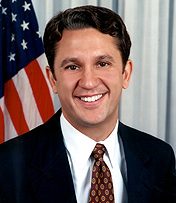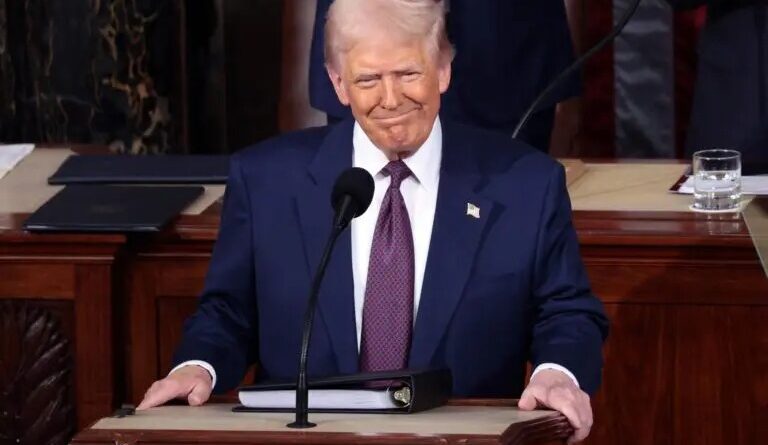‘No way in the world that Ronald Reagan would ever support Donald Trump,’ adviser to late president says
Former President Ronald Reagan would be appalled by President Donald Trump’s seemingly friendly foreign policy attitude toward Russia and hostile treatment of U.S. allies such as Ukraine, according to a former advisor to the late president.
“There is no way in the world that Ronald Reagan would ever support Donald Trump,” Kenneth L. Adelman told the Baltimore Post-Examiner.
“Ukraine. Overall, standing up to enemies and helping friends. Decency and honesty. In all three categories…Donald Trump is not only deficient, but absolutely miserable in comparison.”
Adelman served as director of the now-defunct U.S. Arms Control and Disarmament Agency (ACDA) from 1983-87.
Adelman also was a key advisor to Reagan at the 40th president’s October 1986 summit with Soviet leader Mikhail Gorbachev in Reykjavik, Iceland.
The summit ended without an agreement, but it set the stage for later meetings that would lead to landmark agreements to eliminate whole classes of nuclear weapons and pave the way for the end of the Cold War.
In 2014, Adelman authored the 375-page memoir: Reagan at Reykjavik: Forty-Eight Hours That Ended the Cold War.
The new Trump administration
It has been just six weeks since Trump began his second non-consecutive term.
The unconventional president has not only shaken up the Washington bureaucracy, but also seeks to redefine American foreign policy commitments to align with his “America First” vision for the country.
America’s traditional European allies and NATO partners such as the U.K., France, and Germany are being asked to fork up more money for the collective defense of the continent as the U.S. prepares to scale back its financial assistance.
This is most notable in Ukraine, which has resisted Russian aggression and invasion for more than three years now with weapons assistance from the West.
In late-February, for perhaps the first time in U.S. history, the U.S. voted against the condemnation of an aggressor nation-Russia-for having invaded Ukraine-joining ranks with totalitarian states such as North Korea, Eritrea, Belarus, and Syria.
Several days later, in an Oval Office meeting, Trump and Vice President J.D. Vance berated Ukrainian President Volodymr Zelensky for not having expressed sufficient gratitude for the assistance his country has received from the U.S.
Zelensky strongly refuted claims of ingratitude.
The administration in conjunction with European allies appeared to have brokered a 30-day ceasefire agreement between Russia and Ukraine. But Russia rejected the deal and it does not explicitly provide assurance for Ukrainian security.
The U.S. has resumed intelligence sharing and military assistance to Ukraine.
“Trump has made the United States a quasi-ally of totalitarians and authoritarians,” Adelman said. “He has changed America from wearing a white hat to wearing a black hat…[Reagan] would look away and say: ‘This is shameful behavior.'”
Adelman said that Reagan, like Trump, favored having the Europeans contribute more money toward their collective defense, but would never have abandoned U.S. security commitments to its allies.
“One of the big contrasts is that Reagan stood up for our allies and stood down adversaries. Donald Trump seems to align us with adversaries and disparage our allies. Reagan said: ‘Mr. Gorbachev, tear down this wall!’ Trump says: ‘The Russians can do whatever the hell they want with NATO.'”
Former Rep. Rick Lazio, a New York Republican, who served in Congress from 1993-01, echoed similar sentiments.
Lazio said Trump’s decision to impose large-scale tariffs on America’s trade partners, and some of the president’s recent foreign policy decisions run counter to Reaganism.

“The Reagan era was arguably the pinnacle of modern American influence in the world, with a rapidly growing economy, an inspirational message that resonated with people who aspired freedom and democracy, a clear-eyed sense of who were our steadfast adversaries were, and an opposition to higher taxes on the American people in all forms, including tariffs. There was a coherence that stitched together domestic policy and foreign policy. Whether you agreed with that framework or not, it made sense here and abroad. The Trump era is a repudiation of all of that. It’s impossible to reconcile calling yourself a Reagan Republican and a Trump Republican.”
The tariffs have wreaked havoc on financial markets, triggering a global sell-off.
Since the beginning of the month when Trump announced a 25% penalty levied on all Canadian and Mexican imports (later postponed to April 2) and a 20% tariff on Chinese imports, the NASDAQ index has fallen into correction territory and the Dow and S&P 500 indexes also have fallen substantially.
Those countries have responded with reciprocal tariffs, as has the European Union in response to Trump having threatened a 200% penalty on certain European alcoholic beverages.
White House Press Secretary Karoline Leavitt claimed at a news conference last week that the tariffs are a “tax cut for the American people.”
The remark was immediately challenged by AP reporter Josh Boak and subsequently led to a heated exchange between the two.
Some of the policies Trump has implemented appear to be based on ideas outlined in the Heritage Foundation’s Project 2025 policy blueprint.
White House Office of Management and Budget (OMB) Director Russell Vought wrote much of the controversial 900-page document. Peter Navarro, the senior White House trade advisor, wrote the chapter on tariff policy. Both also served in the first Trump administration.
During the campaign, Trump tried to distance himself from the blueprint, often saying he was not familiar with it.
Is Trump totally devoid of the principles of Reaganism?
The late president’s eldest son, Michael Reagan, seemingly refuted such claims in a series of recent tweets.
Reagan, a conservative commentator and former talk radio host, took particular issue with the claim that his father would have disagreed with Trump’s tariffs.
Yes my father spoke about Tariffs when he was POTUS..that was 40yrs ago,it is different time with a different POTUS,for Gods sake quit using my father to bash Trump…FYI it is amazing that you all of a sudden support my father when for 8 yrs you treated him like you are treating…
— Michael Reagan (@ReaganWorld) March 7, 2025
A 100% tariff on Japanese electronics like computers, televisions, and power tools in 1987 to address Japan’s violation of a semiconductor trade agreement.
•A 45% tariff on Japanese motorcycles in 1983 to protect Harley-Davidson, although its effectiveness was debated.…— Michael Reagan (@ReaganWorld) March 7, 2025
Reagan previously had been a staunch critic of Trump.
Any host that believes Trump is like my father never really knew my father..It’s an insult.@Newsmax_Media
— Michael Reagan (@ReaganWorld) February 16, 2016
If the Republican Party nominates Trump. I WILL HEAR FROM MY FATHER’S GRAVE “I DIDN’T LEAVE THE PARTY THE PARTY LEFT ME”@Newsmax_Media
— Michael Reagan (@ReaganWorld) March 1, 2016
Tariffs have been part of American trade policy since the beginning of the nation itself.
President George Washington in 1789 approved legislation that levied a 5% penalty on almost all foreign imports.
President Andrew Jackson refused to rescind the Tariff of 1828 Act law his vice president, John C. Calhoun-vigorously opposed and ultimately led to the Nullification Crisis in the early 1830s.
But perhaps the most infamous and well-known tariffs in U.S. history are the Smoot-Hawley tariffs, which were approved by President Herbert Hoover in 1930 and are widely credited with exacerbating the effects of the Great Depression.
In the decades following Smoot-Hawley and up until the second Trump administration, tariff implementation has been mostly small-scale and limited in application.
Adelman said Reagan saw the damage caused by Smoot-Hawley and that that made him very reluctant to impose tariffs.

Bryan is an award-winning political journalist who has extensive experience covering Congress and Maryland state government. His work includes coverage of the election of Donald Trump, the confirmation hearings of Supreme Court Justice Brett Kavanaugh and attorneys general William Barr and Jeff Sessions-as well as that of the Maryland General Assembly, Gov. Larry Hogan, and the COVID-19 pandemic.
Bryan has broken stories involving athletic and sexual assault scandals with the Baltimore Post-Examiner.
His original UMBC investigation gained international attention, was featured in People Magazine and he was interviewed by ABC’s “Good Morning America” and local radio stations. Bryan broke subsequent stories documenting UMBC’s omission of a sexual assault on their daily crime log and a federal investigation related to the university’s handling of an alleged sexual assault.

